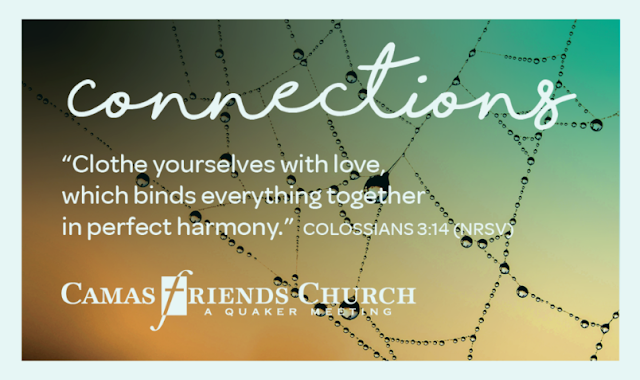 |
| Source. |
For our Quaker congregation, a new year means a new "word of the year." For this year of 2022 the word is connections.
The announcement of our word of the year came with a whole list of queries. They're all substantial and worthwhile, and it would probably take a whole year to get through them all, but one query jumped out at me right away.
How can I strengthen my connection to myself?
Does this strike you as another example of churches that pander to our culture's individualism by emphasizing self-regard over self-abandonment? Not guilty! There can be no genuine connection to self, no healthy self-regard, that doesn't include repentance. This was one of my concerns last week, when I urged us to reset our shame and self-recriminations to zero for the new year, but not at the expense of being truthful before God and those we've harmed. "Self-regard" means regard for our actual selves, not our conceits, nor our self-deceptions.
When we want to strengthen our connection with ourselves, one approach might be to ask ourselves honestly, "Do I spend time simply enjoying my own company? When does this happen, and what might get in the way?" Many of the challenges that we might encounter in the quiet waiting worship of a Friends meeting might also apply to the simple (?) occupation of spending time with ourselves: distractions, addictions, boredom, a deadened sense of curiosity about what is going on right around -- and inside -- us.
The Russian Orthodox physician and bishop Anthony Bloom spoke very helpfully about this connection in a comment he made on the Jesus prayer, Lord Jesus Christ, Son of God, have mercy on me, a sinner. (This is from the same chapter of Conversations about Prayer that I quoted last week. Emphasis in original.)
How can every single person call himself or herself a sinner? Can anyone honestly do this? Would it be true? Wouldn't it be hypocritical?
This would not always be true if the concept of sin related only to the moral categories of righteousness, honesty, goodness in a moral sense. But there is a deeper and more basic meaning of the word "sin."
Sin is, before all else, a person's loss of contact with their own deepest place. Every person is deep -- but so often lives superficially, through superficial feelings and understandings. Instead of living from their depth, acting from the core of their being, people live reactive lives, simply reflecting those rays that fall on them.
This is the first and principal sin: superficiality, loss of inner depth, loss of contact with this depth. As a result, a person loses contact with that which is present at this depth -- that is, with God.
In one of our first conversations, I referred to the words of Michael Ramsey, the Archbishop of Canterbury, who said that in each person there is a bottomless depth that only God can fill. See what happens when a person lives only on their own personal surface: that person loses their connection with God. And having lost that connection with God, they also grow distant from their neighbors, their surroundings, their whole life.
Anthony Bloom invites us to reconnect with ourselves by seeking reconnection with God, who already waits within us with love and mercy. And, conversely, in restoring this connection with God, we're once again living as our true selves -- utterly worth connecting with, spending time with.
Related:
When I first heard that word "connections" proposed as our word of the year, I said to myself, "Now why does that word sound so familiar here in our Pacific Northwest Quaker context?" I quickly remembered -- Connection is the name of the Northwest Yearly Meeting of Friends newsletter. Ironically, that is the family of Friends churches that disconnected our church, and others like us, from the body we once belonged to. As the name of their newsletter, it sounds a bit ironic -- but as our word of the year (plural form), it bears the promise of healing.
Text (Russian) of Anthony Bloom's conversation on prayer quoted above. (Also available as part of this booklet.) The first site has many talks and sermons of Anthony Bloom in English.
The wonderful documentary film Sweet Home Monteverde, which I reviewed in June 2020, is now available for viewing on the Web site of Rocky Mountain Public Broadcasting.
In America, a child is shot every hour.... Read these portraits of thirteen children we lost to guns in 2021. Of course I can't help reaching back to 1970 and adding my own sister Ellen to this tragic catalog.
Kazakhstan: a disinformation case study?
Living "as if the things Jesus taught were actually true" -- Philip Yancey on Desmond Tutu. And Russell P. Johnson on the revolutionary joy of Desmond Tutu.
Paul Anderson on Quakers and the Nobel Peace Prize.
Nancy Thomas may be my favorite list-maker of favorite books.
Virtuoso guitarist Christone "Kingfish" Ingram with a B.B. King classic:
2 comments:
Thank you so much for the reminder. Guilt accompanies any attempt to reconnect with myself - I should be (fill in the blank): working, helping someone else, washing dishes, cooking, walking the dog, exercising . . . how can I justify "wasting" time on myself? Your words flew right into my heart.
Thanks a lot for publication, dear Johan!
A bit unexpected rendering of "sin" as losing contact with your deep self.
PS. Best regards from my family, Happy New Year to Judie and sons!
Post a Comment